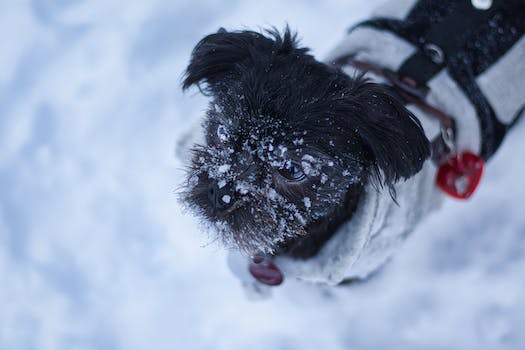Challenges of Raising Affenpinscher Puppies vs Adults: Nurturing the Playful Spirit or Embracing the Maturity.
Raising Affenpinscher puppies and adults come with their own set of challenges. While puppies require more time and effort in terms of training and socialization, adult Affenpinschers may have established behaviors that need to be addressed. Understanding these challenges can help potential owners make informed decisions about raising Affenpinschers at different stages of their lives.
Training Affenpinscher Puppies: Common Challenges and Solutions
Raising a puppy can be an exciting and rewarding experience, but it also comes with its fair share of challenges. This is especially true when it comes to raising Affenpinscher puppies, as they have their own unique set of needs and behaviors. In this article, we will explore some of the common challenges that come with training Affenpinscher puppies and provide some solutions to help you navigate through them.
One of the first challenges you may encounter when training an Affenpinscher puppy is their stubbornness. Affenpinschers are known for their independent nature, which can make them resistant to following commands. It’s important to establish yourself as the pack leader early on and be consistent with your training methods. Positive reinforcement techniques, such as treats and praise, can be effective in motivating your puppy to listen and obey.
Another challenge you may face is their high energy levels. Affenpinschers are a small breed, but they have a lot of energy to burn. This can make it difficult to keep them focused during training sessions. To overcome this challenge, it’s important to provide plenty of physical exercise and mental stimulation for your puppy. Taking them for daily walks, playing fetch, and providing puzzle toys can help tire them out and make them more receptive to training.
Socialization is another important aspect of raising an Affenpinscher puppy. These dogs can be wary of strangers and may exhibit aggressive behavior if not properly socialized. It’s crucial to expose your puppy to different people, animals, and environments from a young age. This will help them develop confidence and learn how to interact appropriately with others. Puppy socialization classes and regular outings to dog-friendly places can be beneficial in this regard.
Housebreaking can also be a challenge when raising an Affenpinscher puppy. These dogs have a small bladder and may struggle with holding their urine for long periods. It’s important to establish a consistent routine for bathroom breaks and reward your puppy for going outside. Crate training can also be helpful in preventing accidents indoors and teaching your puppy to hold their bladder.
Lastly, it’s important to address any potential behavior problems early on. Affenpinschers can be prone to excessive barking, digging, and chewing if not properly trained. Consistency and positive reinforcement are key in addressing these issues. Redirecting their attention to appropriate toys, providing mental stimulation, and using positive reinforcement techniques can help curb unwanted behaviors.
In conclusion, raising an Affenpinscher puppy comes with its own set of challenges. From their stubbornness to their high energy levels, it’s important to be prepared and patient when training these dogs. By establishing yourself as the pack leader, providing plenty of exercise and mental stimulation, socializing your puppy, and addressing any behavior problems early on, you can set your Affenpinscher puppy up for success. Remember, training takes time and consistency, but with the right approach, you can raise a well-behaved and happy Affenpinscher.
Socializing Affenpinscher Puppies: Tips for a Smooth Transition
Raising a puppy can be an exciting and rewarding experience, but it also comes with its fair share of challenges. This is especially true when it comes to socializing Affenpinscher puppies. These adorable little dogs have a unique personality and require special attention to ensure they grow up to be well-rounded and confident adults.
One of the first things to consider when socializing an Affenpinscher puppy is their age. Puppies are like sponges, soaking up everything around them and learning at a rapid pace. This is both a blessing and a challenge. On one hand, it means that they are more receptive to new experiences and can be easily molded into well-behaved dogs. On the other hand, it also means that they are more vulnerable to negative experiences and can develop fears and anxieties if not properly socialized.
To ensure a smooth transition from puppyhood to adulthood, it is important to expose your Affenpinscher puppy to a wide variety of people, animals, and environments. This will help them develop confidence and learn how to navigate different situations. Start by introducing them to family members and close friends, gradually expanding their social circle as they become more comfortable. Take them on walks in different neighborhoods, visit dog parks, and enroll them in puppy socialization classes. These experiences will help them learn how to interact with other dogs and people in a positive and controlled environment.
When socializing your Affenpinscher puppy, it is important to remember that consistency is key. Set clear boundaries and expectations from the beginning and reinforce them consistently. This will help your puppy understand what is expected of them and prevent any confusion or misbehavior. Use positive reinforcement techniques, such as treats and praise, to reward good behavior and discourage unwanted behaviors. This will help your puppy associate positive experiences with socialization and make them more eager to participate in new experiences.
Another important aspect of socializing Affenpinscher puppies is exposing them to different environments. These dogs have a tendency to be wary of new places and experiences, so it is important to gradually introduce them to new environments. Start by taking them on short car rides to different locations, such as parks or pet-friendly stores. As they become more comfortable, gradually increase the duration and distance of these outings. This will help them develop confidence and reduce their fear of new places.
It is also important to expose your Affenpinscher puppy to different sounds, sights, and smells. This can be done through playtime, walks, and even by playing recordings of different noises in the background. By exposing them to a variety of stimuli, you can help them become more adaptable and less likely to develop fears or phobias.
In conclusion, socializing Affenpinscher puppies requires time, patience, and consistency. By exposing them to a wide variety of people, animals, and environments, you can help them develop into confident and well-adjusted adults. Remember to set clear boundaries and expectations, use positive reinforcement techniques, and gradually introduce them to new experiences. With the right approach, you can ensure a smooth transition from puppyhood to adulthood for your Affenpinscher.
Health Concerns in Affenpinscher Puppies: What to Watch Out For
When it comes to raising Affenpinscher puppies, there are a few challenges that owners should be aware of. While these adorable little dogs are known for their playful and mischievous nature, they also require special care and attention, especially when it comes to their health. In this section, we will discuss some of the health concerns that Affenpinscher puppies may face and what owners should watch out for.
One of the most common health concerns in Affenpinscher puppies is dental issues. These dogs have a tendency to develop dental problems, such as tooth decay and gum disease. This is partly due to their small size and the fact that their teeth are crowded together. As a result, it is important for owners to pay close attention to their puppy’s dental health and provide regular dental care, including brushing their teeth and providing appropriate chew toys.
Another health concern in Affenpinscher puppies is respiratory problems. These dogs have a short snout and a flat face, which can make it difficult for them to breathe properly. This can lead to issues such as snoring, wheezing, and even difficulty breathing. It is important for owners to be aware of these potential problems and to seek veterinary care if they notice any signs of respiratory distress in their puppy.
Affenpinscher puppies are also prone to eye problems. Their prominent eyes can be easily injured or irritated, and they may develop conditions such as dry eye or corneal ulcers. It is important for owners to keep a close eye on their puppy’s eyes and to seek veterinary care if they notice any redness, discharge, or signs of discomfort.
Skin allergies are another common health concern in Affenpinscher puppies. These dogs have sensitive skin and may develop allergies to certain foods, environmental allergens, or even grooming products. Owners should be vigilant in monitoring their puppy’s skin for any signs of irritation, such as redness, itching, or hair loss. If allergies are suspected, it is important to work with a veterinarian to identify and manage the triggers.
Lastly, Affenpinscher puppies are prone to certain genetic conditions. These include luxating patella, a condition where the kneecap slips out of place, and Legg-Calve-Perthes disease, a condition where the hip joint deteriorates. It is important for owners to be aware of these potential issues and to work with a reputable breeder who screens their breeding dogs for these conditions. Regular veterinary check-ups and monitoring can help catch these conditions early and provide appropriate treatment.
In conclusion, raising Affenpinscher puppies comes with its own set of challenges, particularly when it comes to their health. Dental issues, respiratory problems, eye problems, skin allergies, and genetic conditions are all concerns that owners should be aware of and watch out for. By being proactive in their care and seeking veterinary attention when needed, owners can help ensure that their Affenpinscher puppies grow up to be healthy and happy adults.
Nutritional Needs of Affenpinscher Puppies: A Guide for Owners

Raising a puppy can be an exciting and rewarding experience, but it also comes with its fair share of challenges. This is especially true when it comes to Affenpinscher puppies, as they have specific nutritional needs that must be met in order for them to grow and develop properly. In this guide, we will explore the nutritional needs of Affenpinscher puppies and provide some tips for owners to ensure their furry friends are getting the right nutrients.
One of the first things to consider when it comes to the nutritional needs of Affenpinscher puppies is their small size. These little dogs have tiny stomachs, which means they need to eat smaller, more frequent meals throughout the day. It’s important to provide them with a high-quality puppy food that is specifically formulated for small breeds. This will ensure that they are getting all the essential nutrients they need in the right proportions.
Protein is a crucial component of a puppy’s diet, as it helps with muscle development and growth. Look for a puppy food that contains a good amount of high-quality animal protein, such as chicken or beef. Avoid foods that list meat by-products or fillers as the main ingredients, as these are not as nutritious for your puppy.
In addition to protein, Affenpinscher puppies also need a good balance of fats and carbohydrates in their diet. Fats provide them with energy and help with the absorption of certain vitamins, while carbohydrates provide a source of quick energy. Look for a puppy food that contains healthy fats, such as omega-3 fatty acids, and complex carbohydrates, such as whole grains.
It’s also important to consider the specific needs of your Affenpinscher puppy based on their age. Younger puppies require more calories and nutrients to support their rapid growth, while older puppies may need a slightly different balance of nutrients as they transition into adulthood. Consult with your veterinarian to determine the best feeding plan for your puppy based on their age and individual needs.
In addition to providing a balanced diet, it’s important to ensure that your Affenpinscher puppy has access to fresh, clean water at all times. Puppies can easily become dehydrated, especially if they are active or in hot weather. Make sure to check their water bowl regularly and refill it as needed.
Transitioning from puppyhood to adulthood can also present its own set of challenges when it comes to the nutritional needs of Affenpinschers. As they grow older, their metabolism slows down and they may become less active. This means that they may require fewer calories and a different balance of nutrients. It’s important to adjust their diet accordingly to prevent weight gain and maintain their overall health.
In conclusion, raising an Affenpinscher puppy comes with its own set of challenges, particularly when it comes to meeting their specific nutritional needs. Providing a balanced diet that is appropriate for their age and size is crucial for their growth and development. Consult with your veterinarian to determine the best feeding plan for your puppy, and remember to provide them with fresh water at all times. With the right nutrition, your Affenpinscher puppy will grow into a healthy and happy adult.
Grooming Affenpinscher Puppies: Overcoming Potential Difficulties
When it comes to grooming Affenpinscher puppies, there are a few potential difficulties that owners may face. These challenges can be quite different from those encountered when grooming adult Affenpinschers. In this article, we will explore some of the unique grooming challenges that come with raising Affenpinscher puppies and discuss strategies for overcoming them.
One of the main challenges of grooming Affenpinscher puppies is their high energy levels. Puppies are naturally curious and full of energy, which can make it difficult to keep them still during grooming sessions. They may squirm, wiggle, and try to play with the grooming tools, making it hard to get the job done. To overcome this challenge, it is important to start grooming your Affenpinscher puppy from a young age. By introducing them to the grooming process early on, they will become more accustomed to it and learn to stay still. Additionally, using positive reinforcement techniques such as treats and praise can help keep them focused and cooperative during grooming sessions.
Another potential difficulty when grooming Affenpinscher puppies is their tendency to have a thick, wiry coat. This type of coat requires regular brushing to prevent matting and tangling. However, puppies may not be used to the sensation of being brushed and may find it uncomfortable or even painful. To make the grooming process more comfortable for your puppy, it is important to use the right tools and techniques. Start by using a soft brush or comb to gently remove any tangles or mats. Be sure to brush in the direction of hair growth to avoid causing any discomfort. Gradually introduce your puppy to more advanced grooming tools, such as slicker brushes or grooming rakes, as they become more comfortable with the process.
In addition to their thick coat, Affenpinscher puppies also have a unique facial structure that requires special attention during grooming. Their short muzzle and prominent eyes can make them more prone to eye discharge and tear staining. Regularly cleaning their eyes with a damp cloth or specialized eye wipes can help prevent staining and keep their face clean and healthy. It is also important to regularly check their ears for any signs of infection or excessive wax buildup. Gently cleaning their ears with a veterinarian-approved ear cleaner can help prevent ear problems and keep them comfortable.
Lastly, grooming Affenpinscher puppies can be a challenge due to their small size. Their tiny bodies and delicate bones require extra care and caution during grooming. It is important to handle them gently and avoid putting too much pressure on their joints. Using a grooming table or a non-slip surface can help provide stability and prevent any accidents. Additionally, it is crucial to use grooming tools that are specifically designed for small breeds to ensure their safety and comfort.
In conclusion, grooming Affenpinscher puppies can present unique challenges compared to grooming adult Affenpinschers. Their high energy levels, thick coat, unique facial structure, and small size can all make the grooming process more difficult. However, with patience, proper tools, and early introduction to grooming, these challenges can be overcome. By taking the time to groom your Affenpinscher puppy regularly and using positive reinforcement techniques, you can ensure that they have a healthy and happy grooming experience.
Exercise Requirements for Affenpinscher Puppies: Balancing Energy Levels
When it comes to raising Affenpinscher puppies, one of the biggest challenges is balancing their energy levels. These little bundles of joy are known for their high energy and playful nature, which can make it difficult to keep up with their exercise needs. However, it is crucial to provide them with enough physical activity to prevent them from becoming bored or destructive.
Affenpinscher puppies have a lot of energy to burn, and they need regular exercise to keep them happy and healthy. They are a small breed, but don’t let their size fool you – they have a big personality and require plenty of physical activity to keep them stimulated. Daily walks are a great way to provide them with the exercise they need, but it’s important to remember that they have short legs and may tire easily. Gradually increase the length and intensity of their walks as they grow older and build up their stamina.
In addition to walks, Affenpinscher puppies also enjoy playing games that challenge their minds and bodies. Interactive toys, such as puzzle toys or treat-dispensing toys, can keep them entertained for hours. These toys not only provide physical exercise but also mental stimulation, which is essential for their overall well-being. Engaging in playtime with your puppy is also a great way to bond with them and build a strong relationship.
Another challenge when it comes to exercising Affenpinscher puppies is finding the right balance between physical activity and rest. While it’s important to provide them with enough exercise, it’s equally important to ensure they have enough time to rest and recover. Puppies, like human babies, need plenty of sleep to support their growth and development. Over-exercising them can lead to exhaustion and even injuries. It’s crucial to pay attention to their cues and provide them with enough downtime to recharge.
As Affenpinscher puppies grow into adults, their exercise needs may change. While they will still require regular physical activity, their energy levels may decrease slightly. Adult Affenpinschers are generally more calm and less hyperactive than puppies. However, it’s important not to let them become couch potatoes. Regular exercise is still essential for their physical and mental well-being.
Adult Affenpinschers can benefit from a variety of exercises, including walks, playtime, and even agility training. Walking is a great way to keep them fit and healthy, and it also provides an opportunity for them to explore their surroundings. Playtime, whether it’s with toys or other dogs, can help keep them mentally stimulated and prevent boredom. Agility training is a fun and challenging activity that can help keep their minds sharp and their bodies active.
In conclusion, raising Affenpinscher puppies and adults comes with its own set of challenges when it comes to exercise requirements. Balancing their energy levels is crucial, as they need enough physical activity to prevent boredom and destructive behavior. Providing them with regular walks, interactive toys, and playtime can help keep them happy and healthy. As they grow older, their exercise needs may change, but it’s important to continue providing them with regular physical activity to support their overall well-being.
Behavioral Challenges in Affenpinscher Adults: Understanding and Addressing
Raising a dog, whether it’s a puppy or an adult, comes with its own set of challenges. However, when it comes to Affenpinschers, there are some specific behavioral challenges that you may encounter with adult dogs. Understanding and addressing these challenges is crucial for a harmonious relationship with your furry friend.
One of the most common behavioral challenges in Affenpinscher adults is separation anxiety. These dogs are known for their strong attachment to their owners, and they can become extremely anxious when left alone. This can lead to destructive behavior, excessive barking, and even self-harm. To address this challenge, it’s important to gradually acclimate your Affenpinscher to being alone. Start with short periods of separation and gradually increase the duration. Providing them with interactive toys and creating a safe and comfortable space can also help alleviate their anxiety.
Another challenge that Affenpinscher adults may face is aggression towards other dogs or strangers. These dogs have a strong protective instinct, and if not properly socialized, they may exhibit aggressive behavior. It’s important to expose your Affenpinscher to different people, animals, and environments from a young age. Positive reinforcement training can also be effective in teaching them appropriate behavior and helping them overcome their aggression.
Affenpinschers are also known for their stubbornness, which can present a challenge when it comes to training. These dogs have a mind of their own and may not always be eager to please their owners. However, with patience, consistency, and positive reinforcement, you can successfully train your Affenpinscher. It’s important to make training sessions fun and engaging, as these dogs respond well to positive reinforcement and rewards.
Another behavioral challenge that Affenpinscher adults may face is excessive barking. These dogs have a tendency to bark at anything and everything, which can be quite annoying for both you and your neighbors. To address this challenge, it’s important to understand the underlying cause of their barking. It could be due to boredom, anxiety, or a need for attention. Providing them with mental and physical stimulation, as well as teaching them a “quiet” command, can help reduce their barking.
Lastly, Affenpinschers can be prone to possessiveness over their toys, food, or even their owners. This can lead to resource guarding behavior, which can be problematic in a household with children or other pets. To address this challenge, it’s important to establish yourself as the pack leader and teach your Affenpinscher that sharing is a positive behavior. Gradually introduce them to new people and animals, and reward them for calm and non-possessive behavior.
In conclusion, raising an Affenpinscher adult comes with its own set of behavioral challenges. From separation anxiety to aggression and stubbornness, it’s important to understand and address these challenges to ensure a happy and well-behaved dog. With patience, consistency, and positive reinforcement, you can overcome these challenges and build a strong bond with your Affenpinscher. Remember, every dog is unique, and what works for one may not work for another. So, be patient, be understanding, and most importantly, be a loving and responsible owner.
Aging Affenpinscher Dogs: Coping with Senior Health Issues
Raising a dog, whether it’s a puppy or an adult, comes with its own set of challenges. However, when it comes to Affenpinschers, there are some specific challenges that you may face when raising them as puppies compared to when they become adults. In this article, we will explore the challenges of raising Affenpinscher puppies versus adults and how to cope with the health issues that senior Affenpinschers may experience.
When you bring home an Affenpinscher puppy, you are in for a whirlwind of energy and mischief. These little bundles of joy are known for their playful and mischievous nature. They have a lot of energy to burn and require plenty of exercise and mental stimulation. This means that you will need to dedicate a significant amount of time and effort to keep them entertained and prevent them from getting bored.
Potty training is another challenge that comes with raising Affenpinscher puppies. Like any other breed, they need to be taught where and when to do their business. This requires consistency, patience, and a lot of positive reinforcement. Accidents are bound to happen, but with time and effort, your Affenpinscher puppy will learn to do their business outside or on designated potty pads.
As your Affenpinscher puppy grows, you will also need to focus on their socialization. Affenpinschers can be wary of strangers and other animals if not properly socialized from a young age. Exposing them to different people, animals, and environments will help them become well-rounded and confident adults. This means taking them to puppy classes, organizing playdates, and exposing them to various situations in a controlled and positive manner.
On the other hand, raising an adult Affenpinscher comes with its own set of challenges. While they may have outgrown their puppy energy, they still require regular exercise and mental stimulation. However, the challenge lies in finding the right balance. Adult Affenpinschers are prone to obesity, so it’s important to provide them with enough exercise to keep them fit and healthy without overexerting them.
As Affenpinschers age, they may also start experiencing health issues commonly associated with senior dogs. These can include joint problems, dental issues, and vision or hearing loss. It’s important to keep a close eye on your aging Affenpinscher and take them for regular check-ups with the vet. Early detection and treatment of any health issues can greatly improve their quality of life.
Coping with senior health issues in Affenpinschers requires a proactive approach. Regular exercise can help keep their joints healthy and prevent stiffness. Providing them with a balanced diet that meets their nutritional needs is also crucial. Additionally, regular dental care, such as brushing their teeth and providing dental chews, can help prevent dental issues.
As your Affenpinscher ages, you may also need to make adjustments to their environment to accommodate any vision or hearing loss. This can include using visual cues, such as brightly colored toys or signs, and providing them with a quiet and safe space to retreat to when they need some downtime.
In conclusion, raising Affenpinscher puppies and adults both come with their own unique challenges. Puppies require a lot of time, energy, and patience, while adult Affenpinschers may start experiencing health issues associated with aging. However, with the right approach and care, you can navigate these challenges and provide your Affenpinscher with a happy and healthy life at any stage.
Q&A
1. What are the challenges of raising Affenpinscher puppies?
Raising Affenpinscher puppies can be challenging due to their high energy levels, need for socialization, and house training requirements.
2. How do Affenpinscher puppies differ from adults in terms of challenges?
Affenpinscher puppies require more time and effort for training, socialization, and housebreaking compared to adult dogs.
3. What are the specific training challenges with Affenpinscher puppies?
Affenpinscher puppies can be stubborn and independent, making training more challenging. Consistency, patience, and positive reinforcement are key.
4. Are there any health challenges specific to Affenpinscher puppies?
Affenpinscher puppies may be prone to certain health issues such as dental problems, patellar luxation, and hip dysplasia, which require regular veterinary care.
5. How do the exercise needs of Affenpinscher puppies differ from adults?
Affenpinscher puppies have higher exercise needs compared to adults due to their energy levels. Regular playtime and walks are essential for their physical and mental well-being.
6. Are there any socialization challenges with Affenpinscher puppies?
Affenpinscher puppies need early and consistent socialization to prevent fearfulness or aggression towards strangers or other animals.
7. What are the challenges of housebreaking Affenpinscher puppies?
Housebreaking Affenpinscher puppies can be challenging due to their small bladder size and stubborn nature. Consistent training and a regular schedule are necessary.
8. Are there any specific challenges in grooming Affenpinscher puppies?
Affenpinscher puppies require regular grooming to maintain their coat’s health and prevent matting. Introducing them to grooming routines early on can help overcome any potential challenges.In conclusion, raising Affenpinscher puppies presents several challenges compared to raising adult Affenpinschers. Puppies require more time, attention, and patience for housebreaking, socialization, and training. They have higher energy levels and may exhibit destructive behaviors. Additionally, puppies need a consistent routine and a safe environment to thrive. On the other hand, adult Affenpinschers are generally more settled, already housebroken, and have established personalities. However, they may require additional time and effort to adapt to a new home and family. Overall, both stages of raising Affenpinschers come with their own set of challenges, and it is important for potential owners to consider their lifestyle and commitment before making a decision.



